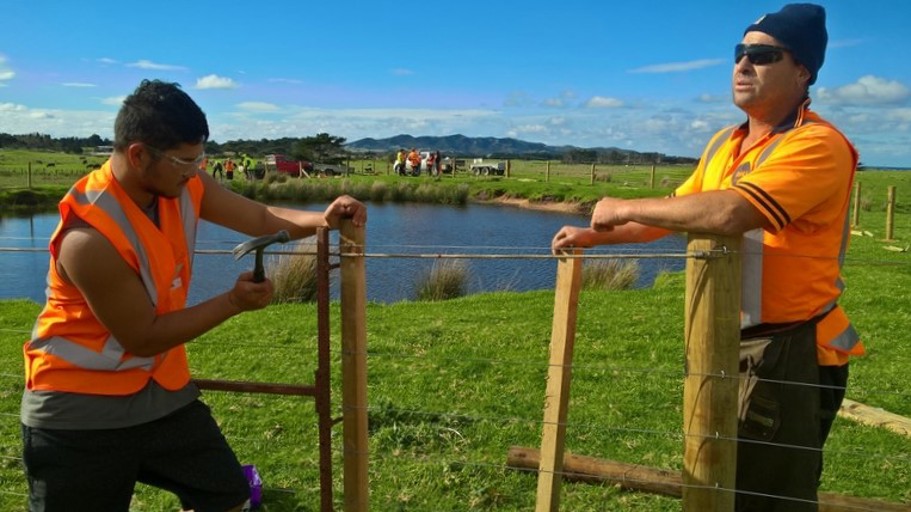WaiRestoration
Enviroschoools WaiRestoration comprises seven strands – WaiFencing, WaiNurseries, WaiPlanting, WaiMaintenance, WaiMonitoring, WaiEnterprise and Save a Species.
WaiRestoration looks at our relationship with fresh water and how past and present practices have affected the mauri of waterways. School communities investigate and understand water – where it comes from, the diversity of life it supports and its life-giving properties.The programme gets young people and local communities involved in the restoration of waterways and biodiversity. Its success is a result of relationship building using a regional approach that harnesses the power of partnerships and collaboration.These genuine partnerships between tangata whenua, schools, community agencies and farmers/landowners are vital to the programme, which involves and excites thousands of young people all around the country.
WaiFencing – keeping stock out of waterways
Students learn how to build fences to exclude stock from waterways and other biodiversity-rich areas. They are taught fencing knots and ties, to identify fencing tools and materials, how to build and repair a multiple wire fence line, and electric fencing. On the assessment day, students construct a new fence to exclude stock from a waterway. Students can gain NCEA credits through this course.
WaiNurseries – growing riparian plants
Students love learning skills important for running a plant nursery in this strand. They are shown how to set-up and maintain a nursery, and find out about eco-sourcing, sowing seeds, potting-on, making cuttings and local bush knowledge.
WaiPlanting – planting beside waterways
Students learn how to plant riparian zones – the strips of land beside streams, rivers, lakes, wetlands and drains. They find out what, where and how to plant, and become skilled at using native species to stabilise stream edges and filter or absorb runoff.
WaiMaintenance – keeping out plant and animal pests
Students learn that controlling plant and animal pests is essential to healthy riparian zones. They learn how to identify and control weeds and animal pests and get involved in the management of the areas they plant.
WaiMonitoring – testing and tracking water quality
Students are shown how to monitor water quality through a series of tests including pH, clarity, and temperature. They observe and record other indicators of healthy water such as invertebrates, fish and vegetation and they can monitor plant and animal pests to see what effect they have on native plant growth rates and survival.
WaiEnterprise – creating sustainable employment
School communities learn about the economic opportunities that can arise from caring for the waterways, including fencing, selling plants and providing a planting and maintenance service. Students can be part of a whole-of-school focus or pursue their own areas of interest.
Save a Species – restoring endangered plants and animals
Using Department of Conservation survey information and expert support, students can learn about threatened plants and animals in their local area. They can choose to help save a species through a range of actions including habitat protection and propagating plants
 Fencing Off A Waterway
Fencing Off A Waterway
 Another Waterway Fenced Off
Another Waterway Fenced Off
 School Shade House
School Shade House
 Potting Shed
Potting Shed
 Potting Up
Potting Up
 Seedlings
Seedlings
 Seed Sourcing In School Grounds
Seed Sourcing In School Grounds
 Growing Riparian Plants
Growing Riparian Plants
 Waiplanting
Waiplanting
 Wetland
Wetland
 Lake Owhareiti
Lake Owhareiti
 Mahi Tahi
Mahi Tahi
 Mangere Catchment
Mangere Catchment
 Planting Demo
Planting Demo
 Planting Beside Waterways
Planting Beside Waterways
 Tracking Kiwi
Tracking Kiwi
 Checking For Kauri Dieback Disease
Checking For Kauri Dieback Disease
 Cleaning Up Kauri Dieback Vectors
Cleaning Up Kauri Dieback Vectors
 Eco Sourcing
Eco Sourcing
 Farmers & Teachers Working Together
Farmers & Teachers Working Together
 Elver (Baby Tuna) ID
Elver (Baby Tuna) ID
 Checking Out What Has Been Caught In The Gee Minnow Traps
Checking Out What Has Been Caught In The Gee Minnow Traps
 Wetland Observation
Wetland Observation
 Investigating Local Waterways
Investigating Local Waterways
 Investigating Plant Pests
Investigating Plant Pests
 Kauri Dieback Prevention
Kauri Dieback Prevention
 Keeping Out Mustelids
Keeping Out Mustelids
 Kindergarten Rat Trap Line
Kindergarten Rat Trap Line
 Lake Kanono Pouto
Lake Kanono Pouto
 Measuring Elvers (Baby Tuna)
Measuring Elvers (Baby Tuna)
 Native And Pest Fish ID
Native And Pest Fish ID
 Pest Plant ID
Pest Plant ID
 Pest Plant Sniffer Dog
Pest Plant Sniffer Dog
 Rangatahi Measure Water Clarity
Rangatahi Measure Water Clarity
 Save A Species Inanga
Save A Species Inanga

